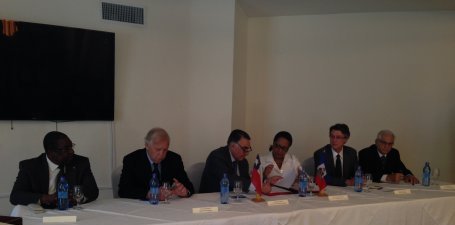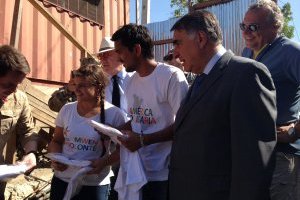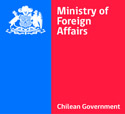
The Under-Secretary of Foreign Affairs, Edgardo Riveros, along with the Minister of Defense, Jorge Burgos, traveled to Haiti to visit the Chilean troops, and announced the decision of the Government of Chile to contribute USD $300,000 to the "Cholera Vaccination Program," which is jointly supported through the United Nations system and the "National Plan for the Elimination of Cholera in Haiti."
The Chilean contribution will permit the vaccination of more than 25,000 people. With this contribution, Chile joins the efforts of the Haitian authorities, supported by the international community through the United Nations system in the fight against the disease.
Under-Secretary Riveros and the Minister of Health of Haiti, Florence Duperval Guillaume, signed a joint declaration regarding the announcement by Chile, reaffirming its commitment to the institutional strengthening and development of Haiti and its people.
In Haiti, Chile has implemented and maintains several projects in the area of education, reconstruction, rural development and human capital formation. As well, Chile has created a program to strengthen Haitian law enforcement capabilities, held in Santiago. Chile has also participated in MINUSTAH, the United Nations Stabilization Mission in Haiti, since its inception over 10 years ago.
 The cholera epidemic is currently one of the main challenges facing the Government of Haiti. It is the most severe in the Western Hemisphere, according to the latest UN figures, with 712,330 possible cases and an estimated 8,655 deaths related to the disease. Thanks to the efforts of the Haitian authorities and the National Plan for the Eradication of Cholera 2013-2022, supported by the international community, cholera cases have been significantly reduced.
The cholera epidemic is currently one of the main challenges facing the Government of Haiti. It is the most severe in the Western Hemisphere, according to the latest UN figures, with 712,330 possible cases and an estimated 8,655 deaths related to the disease. Thanks to the efforts of the Haitian authorities and the National Plan for the Eradication of Cholera 2013-2022, supported by the international community, cholera cases have been significantly reduced.
The "Cholera Vaccination Program" is a safe, affordable and effective intervention that reduces transmission and, consequently, the burden of the disease to the community. "It is a project implemented by the Haitian Ministry of Health and Department of Water and Sanitation, with support from the Pan American Health Organization (PAHO), the World Health Organization (WHO), UNICEF and its partners."
The funds for this grant match Innovative Financing Mechanism applied by Chile, within the framework of Law 20.138 of December 1, 2006. This same resource is used for the contribution of Chile to UNITAID and the Chilean Fund Against Hunger and Poverty, which is administered by the AGCI and UNDP for South-South Cooperation projects.
